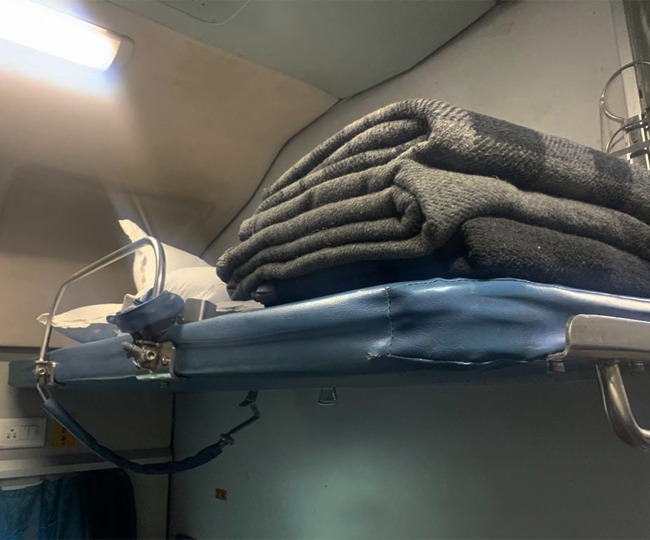
New Delhi: Thousands of people in India travel by train every day but they do not know how clean is the blanket being given to them in the AC coach?
Yes, a recent revelation by the Indian Railways has raised concerns over the cleanliness of the bedding provided to passengers in AC coaches.
This information, obtained by The New Indian Express under the Right to Information (RTI), revealed that while bed sheets and pillow covers are washed after every trip, blankets are washed just once a month. Depending on their condition, some blankets may be washed twice a month. This irregular washing has raised several questions about hygiene, especially for passengers who depend on these blankets during their travels.
Bed charges are also included in the ticket price
Passengers travelling in AC coaches get bedding made up of sheets, pillows and blankets, all packed in brown envelopes. While sheets and pillow covers are cleaned after every journey, the same cannot be said for blankets.
According to Rishu Gupta, section officer, Environment and Housekeeping Management (EnHM) in the Ministry of Railways, the cost of these bedding items is included in the train fare. In select trains like Garib Rath and Duronto, passengers also have the option of purchasing a bedroll kit at an additional cost while booking the ticket.
Housekeeping staff verified blanket washing practices
The RTI reply from the Railway Ministry revealed that woolen blankets are washed “at least once a month, preferably twice a month, subject to available capacity and logistics arrangements”.
However, housekeeping staff working on long-distance trains indicated that blankets are generally washed once a month. An employee with over 10 years of experience said there is no guarantee that blankets are washed twice a month. In most cases, we give blankets for washing only if we notice odour, wetness, vomit, etc. In some cases, we provide clean blankets immediately if the passenger complains.
Caring for blankets after travel raises concerns
After each trip, sheets and pillow covers are bundled and sent to the laundry to ensure they are cleaned before the next trip. Blankets, however, are simply folded and kept in the coach unless they show any issues like stains or odor.
Another housekeeping staff member said that we fold the blankets and keep them in the coach. We send them for laundry only if they smell or some food is visible on them. This practice of leaving blankets unwashed for long periods, sometimes even months, has caused concern among passengers.
Problems with blanket hygiene have already been highlighted in a 2017 report by the Comptroller and Auditor General (CAG), which said some blankets were not washed for up to six months. This history of inadequate hygiene of blankets has fuelled calls for better monitoring and cleaning protocols.
Demand to stop the use of woolen blankets
A retired senior official of the Environment and Housekeeping Management (EnHM) division suggested that the Indian Railways reconsider the use of woollen blankets due to their heavy weight and difficulty in ensuring proper cleaning.
"Blankets are heavy and it is difficult to ensure they are washed properly. It is time the railways stopped using these blankets," he said. The sentiment reflects a wider concern that woollen blankets may not be suitable for long-distance train journeys if hygiene cannot be adequately maintained.
Railway's laundry infrastructure explained
Indian Railways operates a large laundry infrastructure with 46 departmental laundries and 25 BOOT (Build-Own-Operate-Transfer) laundries across the country. Departmental laundries are owned by the railways, but the staff working in these facilities are often employed on a contract basis.
At the boot laundry, the land is owned by the Indian Railways, but the washing equipment and staff are managed by private contractors. Despite these resources, concerns about cleanliness remain, especially with regard to the low washing of blankets.
--Advertisement--

 Priya
Priya Share
Share



